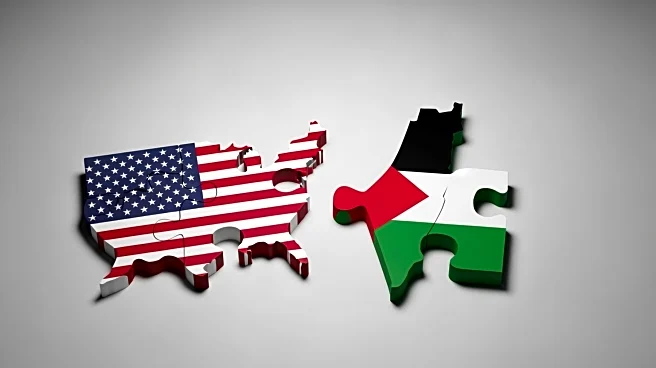What's Happening?
A recent Reuters/Ipsos poll indicates that 59% of Americans support the United States recognizing a Palestinian state. The poll results reveal a significant portion of the American public backing this
diplomatic move, while 33% oppose it, and the remaining respondents are either unsure or did not provide an answer. This sentiment comes amid ongoing tensions in the Middle East, particularly following a temporary cease-fire between Israel and Hamas. The poll reflects a shift in public opinion, potentially influenced by recent events and humanitarian concerns in the region.
Why It's Important?
The poll results are significant as they suggest a growing public support for a change in U.S. foreign policy regarding the Israeli-Palestinian conflict. Recognition of a Palestinian state by the U.S. could have profound implications for international relations and peace efforts in the Middle East. It may influence policymakers and political leaders to reconsider their stance on the issue, potentially leading to diplomatic initiatives aimed at resolving the conflict. The public's opinion could also impact future electoral decisions, as candidates may align their platforms with the majority view to garner support.
What's Next?
If the U.S. government decides to act on this public sentiment, it could lead to diplomatic discussions and negotiations with both Israeli and Palestinian leaders. Such a move might also prompt reactions from other countries, potentially altering alliances and international dynamics in the region. Political leaders and advocacy groups may increase their efforts to lobby for or against recognition, influencing legislative and executive actions. The situation remains fluid, with potential developments depending on both domestic political will and international diplomatic pressures.
Beyond the Headlines
The recognition of a Palestinian state by the U.S. could have ethical and cultural implications, as it touches on issues of self-determination and human rights. It may also affect the U.S.'s role as a mediator in the Middle East, challenging its traditional alliances and requiring a reevaluation of its foreign policy strategies. Long-term shifts could include changes in how the U.S. engages with other nations on matters of sovereignty and conflict resolution.









